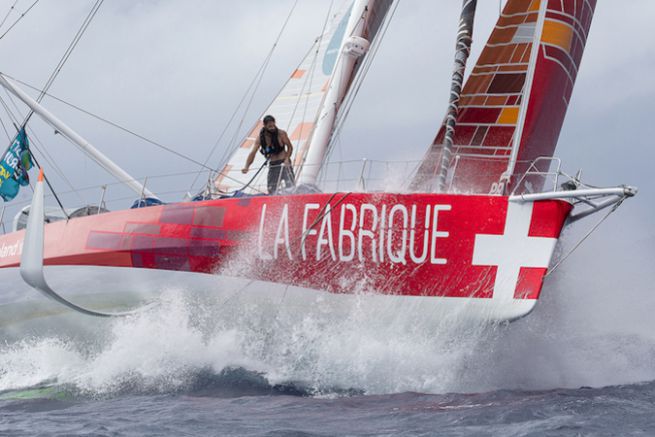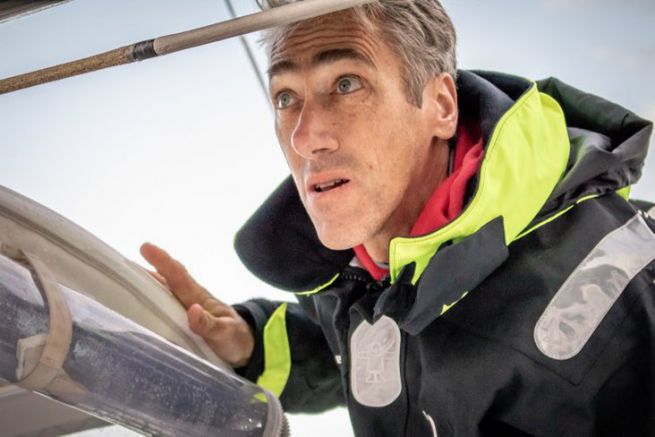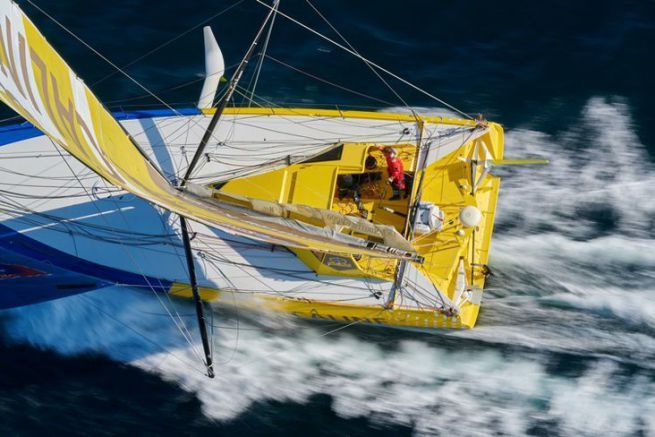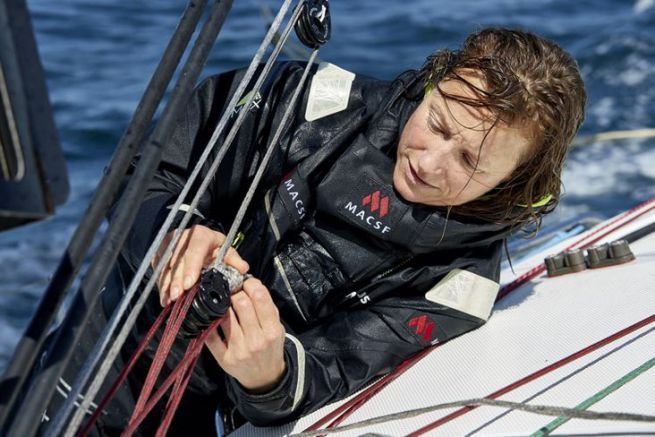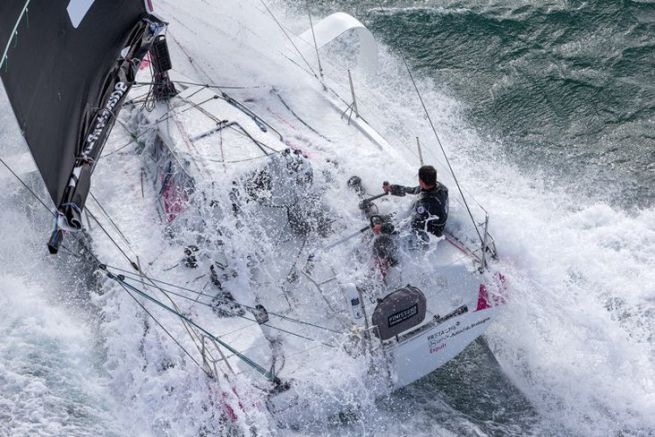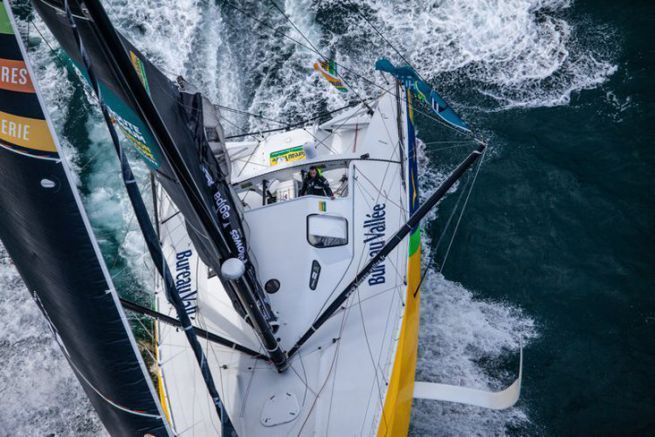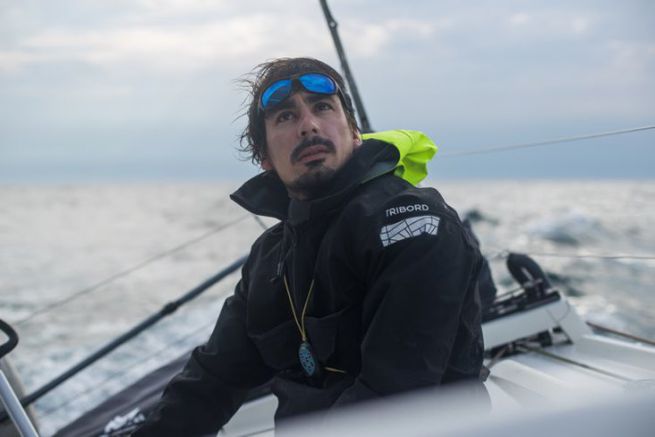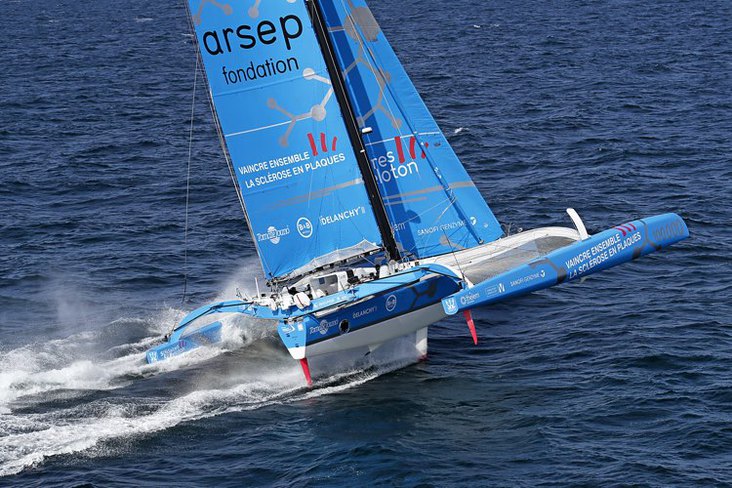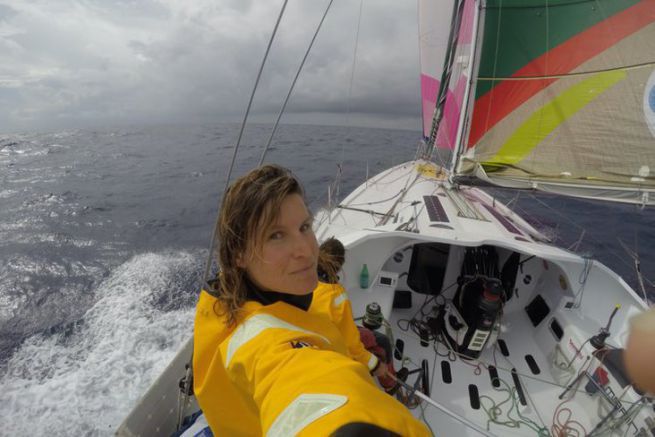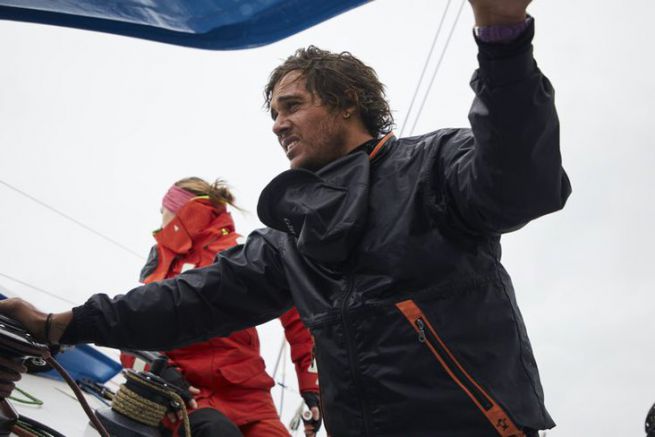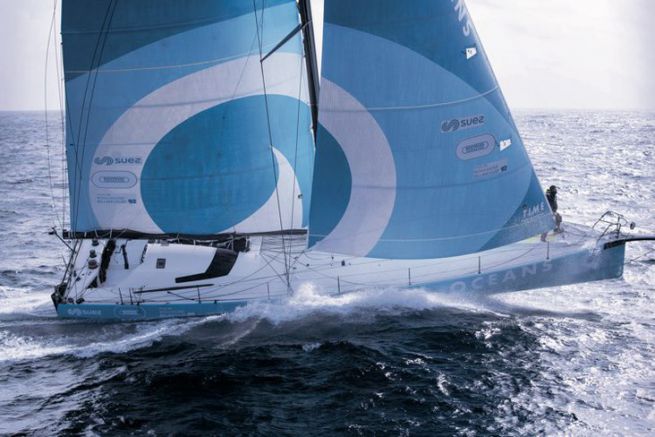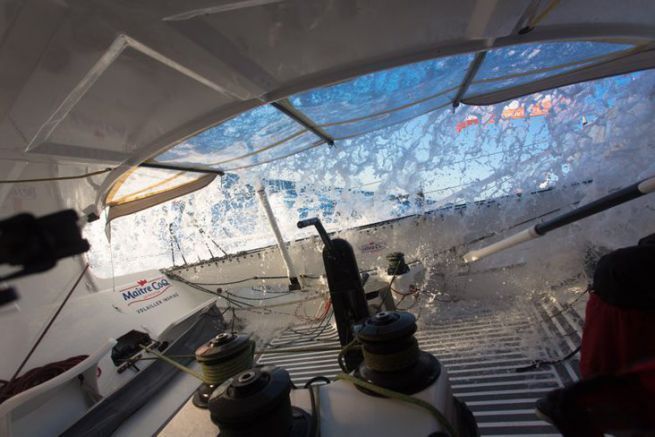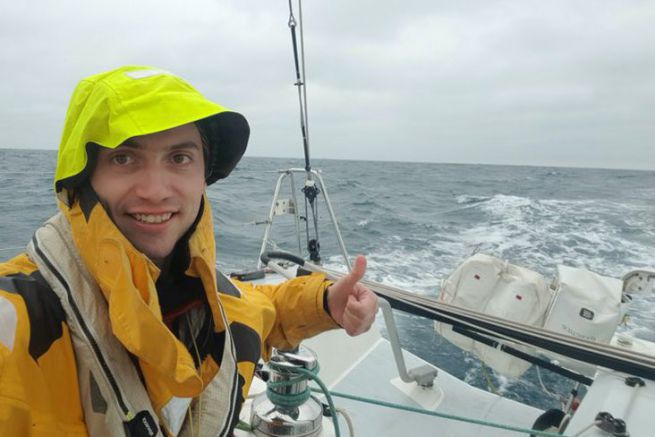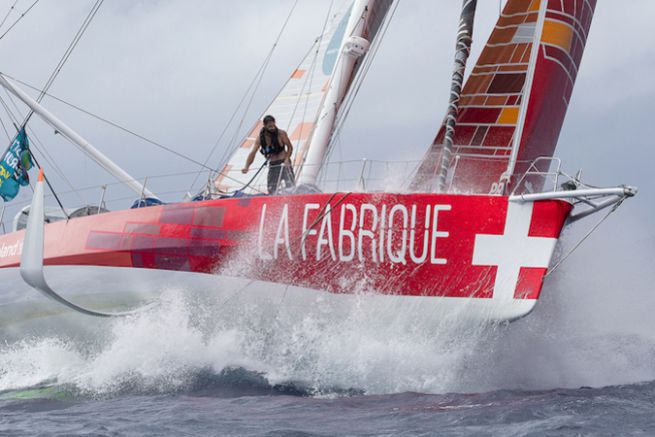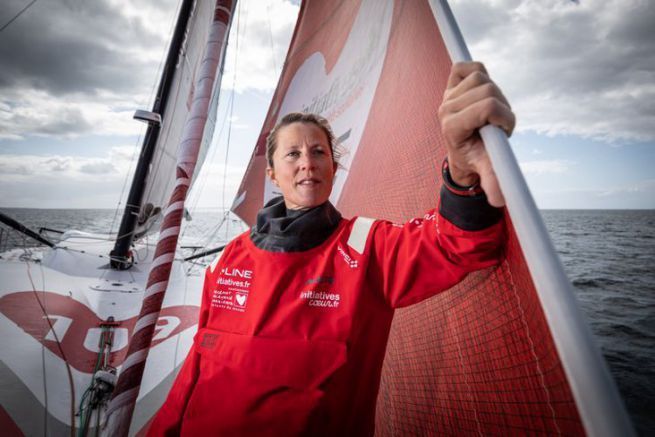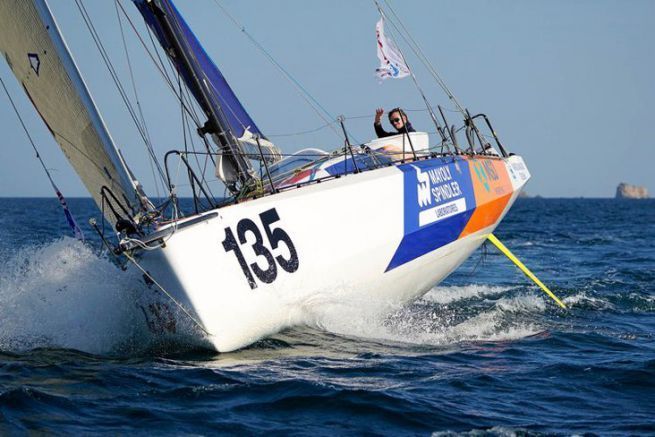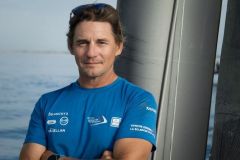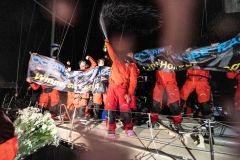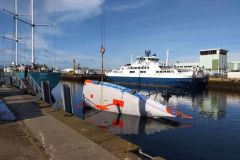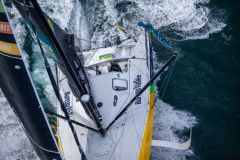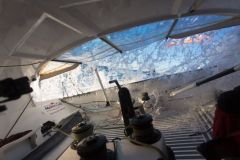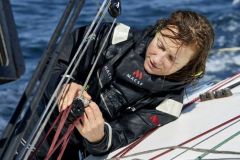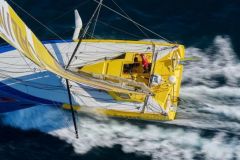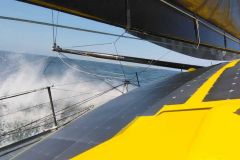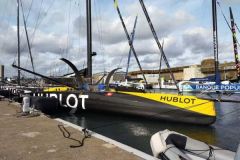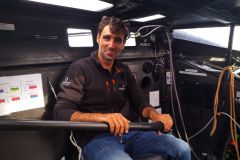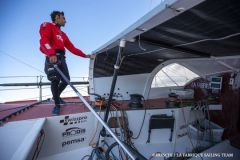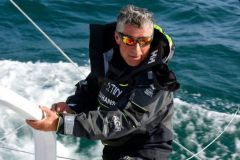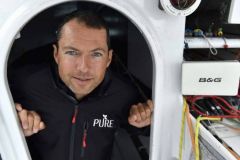Born in Geneva, Switzerland, he spent his childhood, from the age of two, on a boat. It was his parents' boat, moored at Port Noir, on Lake Geneva. In 2001, the family cast off to embark on a round-the-world voyage... that will last eleven years! While still very young, he renovated his first 6.50, and in 2013, finished 11th in the Mini-Transat. He finished 21st in the last Transat Jacques Vabre, this time in the IMOCA class.
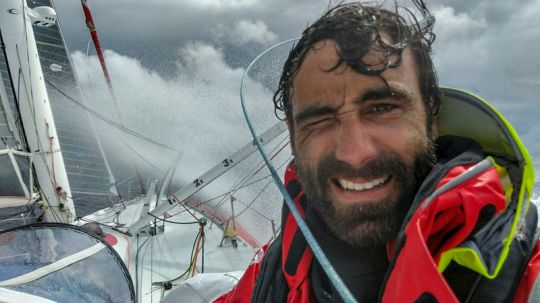
The view
In September 2019, I took part in the Défi Azimut, a double-handed race, to prepare for the Transat Jacques Vabre. We're off the coast of the Ile de Groix. It's the last day. It's a fight. Fatigue is growing. The eyes that we protect behind sunglasses. The sea is smooth. The wind is light. The fog is cut with a knife: we can't even see the head of our own mast! Everything is white-grey all around us... At daybreak we can see, rather than actually seeing, another boat nearby: through the fog we can see a coloured fragment of the hull. We can make out the run-off from the water split by the bow, the noises coming from the manoeuvres... We could only imagine all the rest of the boat around us! For four hours, we play with it, cat and mouse, in this thick fog that camouflages us both. Trying to control an almost invisible opponent is no easy task! I found incredible the feeling of no longer being able to rely on my sight, and having to concentrate on my hearing, to "see" something!
In fact, it was a bit like being in an airplane and going through clouds: there's this foggy mass that gradually gets lighter patches, before finally clearing completely, in a short time and distance. It happened 200 metres before the finish line. Then the wind suddenly picked up again and we saw Groix ahead. And to our lee, on the port side, the other boat was trying, as it had done in the fog, to slip past to leeward of us, but we were blocking it. We knew it was an IMOCA, a new generation IMOCA, which was quite impressive for us! At the slightest gust, it seemed to want to take off, and we were preventing it from doing so. It would fall back down. The end of the story is quite nice - for us, I mean - as we stayed ahead of it!
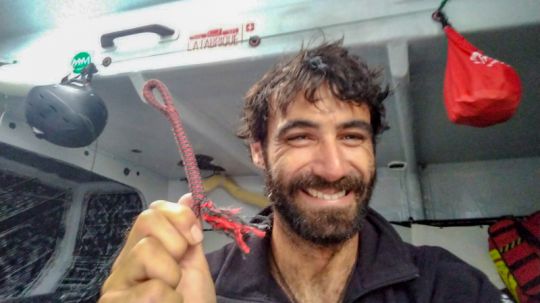
The touch
My most vivid memory, I think, in that sense goes back to the finish of the Vendée Globe in February 2017. I was lucky enough to take part and complete this round the world voyage aboard the boat of my dreams: the Super Bigou, Bernard Stamm's first boat. As a child, I think I was already in love with this boat! It was a little inexplicable. But I found it, compared to the other boats, something more, something special. No doubt its forms a little vintage, so original, and, in the end, ahead of their time. And then, her epic story, certainly also fascinated me: her construction by a group of friends, her retirement in the Vendée Globe, her stay on a dock in Estonia... But that's another story! Let's come back to mine. This circumnavigation of the world was my last sailing on Super Bigou. So when I crossed the finish line, I gave him a little pat on the back to let him know that it was the end of our journey together, to thank him. Under my palm, his freeboard, tired from a circumnavigation of the world, but still flat and rounded: I had something to caress. My palm slipped on it: there was only salt and water to slow it down. I said goodbye to him...
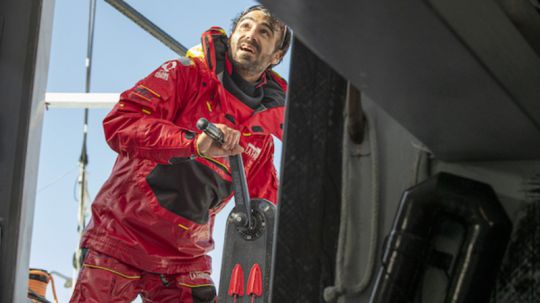
Hearing
It's a pleasant and hard memory that I'm entrusting to you. During the Vendée Globe, we sail the seas of the Deep South, where the unleashed elements take care of the rough stuff... You, and your ears! The boat's hull, in particular, hits the sea hard and makes a sounding board. In short, you live in an enormous hubbub. And when you land, you're on the lookout for the slightest noise in this din that could warn you of a possible problem. You get used to it all in the end. But when you're sailing back up the coast of Brazil, and there's no wind for almost two weeks, you can hear every little wave on the hull when it decides to blow just a little bit. Every slamming of the battens on the mainsail that hesitates between inflating and deflating. The squeaking of the gooseneck, which is full of salt but no longer has any fat. The bottle of water rolling around at the bottom of the cabin. In short, those little noises and others that you couldn't hear at all because the environment was so noisy before and which, at that moment, you remember to your good memory, you perceive them because silence has imposed itself. And that silence, in which those sounds jump to my ears, disturb me, even stress me, I admit it: they tell me that I am not moving forward. Even my sleep has suffered... I finally find it easier to sleep in rough weather than in lighter weather!
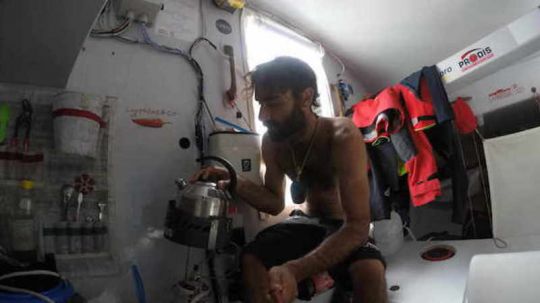
Taste
I was 100 miles north of Guadeloupe during the 2018 Route du Rhum, after 14 days of racing. It was about an hour before nightfall. Unfortunately for me, I'd lost my spinnaker and was sailing under sail with my small gennaker only. And the damage continued: then the lashing of the main halyard broke and the boom fell on deck. All I had to do was climb to the top of my thirty-metre mast to unblock the halyard at the top and then hoist the mainsail. Wind 15 to 18 knots and a three-metre swell. That's why I was constantly being tossed about. After a lot of effort to get myself up there, hold on to it and make repairs, I went back down and that's when I set foot on deck and that's when I got that unpleasant, pasty taste in my mouth, which is so peculiar and looks a bit like blood. My body must have relaxed at that moment, the stress must have subsided and that sort of bad breath came into my mouth! Before, I was focused on this rope to recover... Especially as I knew, even if I couldn't see it, that I was sailing close to another competitor, Stéphane Le Diraison. And it was out of the question for me that he would pass in front of me! This taste held me while I was reefing the sail, 90 kg anyway... One hour in all. When everything was finished, I collapsed from fatigue in the cockpit. The boat started to pick up speed. The coke bottle went through. Getting rid of the bad taste, what a relief it was... certainly amplified by the fact that I'd managed to keep my place!
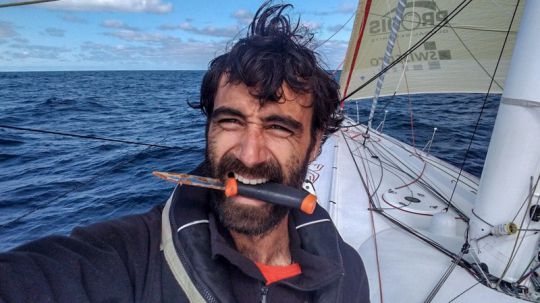
The sense of smell
I'll trade the competition for that sense of childhood... if you don't mind! It was in 2001, when I was eight years old, and my family had embarked on a round-the-world voyage on a sailing boat almost twelve metres long, a Long Vent 40. We had been crossing the Atlantic for 18 days. Fifty miles ahead of us: Martinique. Of course, we couldn't see it then... but we could feel it! The trade winds were blowing, at around 15 knots, full astern in our scissor sails. And against this wind, quite suddenly, in the space of two hours, came up, from this still invisible land, a dense smell of damp earth... Comes to mind, when I think back, the image of a garden just watered, and the fresh, pure perfume that comes to tickle your nostrils then. One whole night, he has perfumed the air, even though it is still marine. The whole family was really amused and amazed: we never imagined we could feel it from so far away..
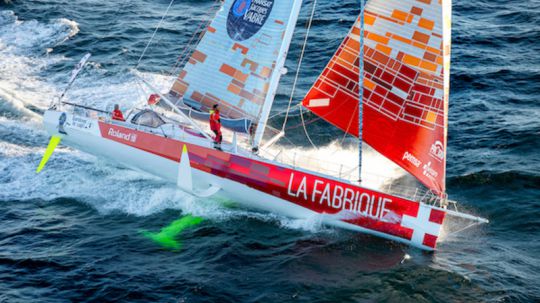
What about fear?
In 2010, my father and I decided to double-handedly cross the Pacific: a nautical challenge, a delirium between us a bit daring seen in retrospect, a kind of training for me as well for the future. In short, in mid-December, we set off for the New Zealand / New Caledonia leg. Our boat, still the family boat, which is 35 years old, is not equipped with anything: no satellite link, no weather forecast, not even an automatic pilot. With three days to go to the finish, the tail of a cyclone surprises us: 50 knots of wind, 10 metres of waves. Nothing quite dramatic for us then: we know the boat, solid, we know ourselves, well. We reduce the sail area and take it. Until the boat begins to behave strangely, when you feel something strange at the helm, when you hear unusual noises... It's when we open the boat's hold that we understand where it all comes from: the top stop of the rudder stock is threatening to come loose... And almost in rhythm with the swell, the hull turns around the rudder, which stays in line with the axis. In short, things are coming apart! The water is also starting to penetrate the hold... That's when we thought that it could get hot for us. I clearly understood it when my father put the beacon in my hands and told me to set it off if necessary. He whom I'd always seen calm and positive on board, I found him uncomfortable! He rushed into the hold: he just had to - simply! - block this room, to save the boat. He took out all the tools: grinder, drill, generator... In the cockpit, given the sailing conditions, everything was worthwhile. But in the end, and very fortunately, my father's do-it-yourself work held up. So much so that I don't think the boat has been better repaired since then. In short, once we were calm, we were able to celebrate... Christmas! Yes, that day, everything was there: the storm, the breakage, the repairs... and the party. A little rum was in order, wasn't it? Which we enjoyed, laughing about our adventures.
